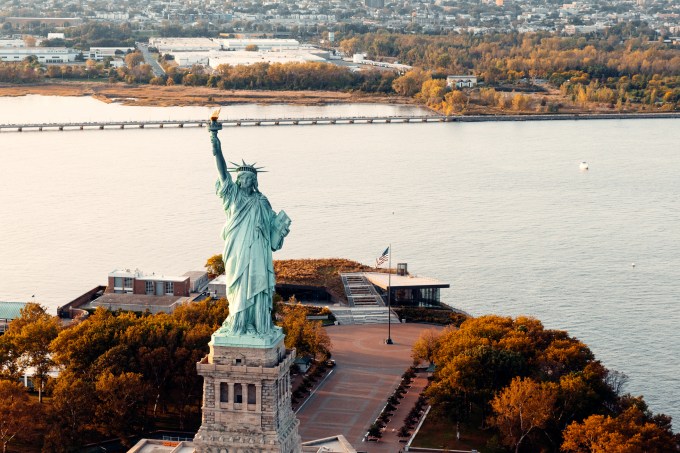
Image Credits:Westend61 / Getty Images
Amr Awadallah, founder of AI startup Vectara, had two reactions when he heard about changes to the H-1B visa program that raise the application fee for each visa to $100,000.
He was not surprised. But he was dismayed.
“I can’t afford to pay $100,000,” Awadallah told TechCrunch. He’s hired one employee on an H-1B, and while the new fee only applies to new applications, he believes it’s too high for many startups and will price them out of hiring internationally.
The H-1B visa was created to allow companies to hire skilled talent from a worldwide market for such occupations as IT and engineering. On Friday, Trump announced that the fee hike, typically paid by the employer, would increase from $2,000-$5,000 to $100,000 per application, a change that will especially be felt with the new batch of visas available in March.
Immigration is a key issue for President Trump, who, even dating back to his 2016 campaign run, accused companies of using the H-1B to take jobs from U.S. citizens.
Critics of the fee hike note that this visa helped bring in people who have gone on to start or run multibillion-dollar companies. Former holders include Google’s Sundar Pichai, Microsoft’s Satya Nadella, and Elon Musk. The visa has been more accessible than the O-1 visa for extraordinary ability, and quicker to obtain than a green card.
“The impact will be severe on the competitiveness and innovation of smaller startups compared to the hyperscales, the big businesses,” Awadallah said. While Big Tech can more easily afford such fees, he feels that startups will miss out. Pricing startups out, he said, “will impact innovation in very, very negative ways longer term.”
Join 10k+ tech and VC leaders for growth and connections at Disrupt 2025
Netflix, Box, a16z, ElevenLabs, Wayve, Sequoia Capital, Elad Gil — just some of the 250+ heavy hitters leading 200+ sessions designed to deliver the insights that fuel startup growth and sharpen your edge. Don’t miss the 20th anniversary of TechCrunch, and a chance to learn from the top voices in tech. Grab your ticket before Sept 26 to save up to $668.
Join 10k+ tech and VC leaders for growth and connections at Disrupt 2025
Netflix, Box, a16z, ElevenLabs, Wayve, Sequoia Capital, Elad Gil — just some of the 250+ heavy hitters leading 200+ sessions designed to deliver the insights that fuel startup growth and sharpen your edge. Don’t miss the 20th anniversary of TechCrunch, and a chance to learn from the top voices in tech. Grab your ticket before Sept 26 to save up to $668.
Could cost the tech industry $5.5 billion a year
More than 700,000 people live in the U.S. on an H-1B, and they’ve brought with them more than 500,000 dependents, such as spouses (who are permitted to work under this visa) and children, according to the immigration and criminal justice advocacy group fwd.us. Indian nationals are the largest recipients of the visa, followed by China and the rest of the world, according to the U.S. Citizenship and Immigration Services.
Only 85,000 new people a year can receive the visa (20,000 of them must have just graduated from a U.S. university), and demand outstrips availability, so H-1Bs are allocated at random, in a lottery held in March. Tech companies have lobbied for years for an increase in annual H-1B limits.
Critics allege that these companies are using H-1B holders to replace U.S. workers with lower-paid employees from overseas. Others say it exploits foreign workers, as the visa is tied to the employer, so workers can’t easily switch jobs and they face deportation if they lose their jobs.

More than 700,000 people live in the U.S. on an H-1B, and they’ve brought with them more than 500,000 dependents, such as spouses and children.Image Credits:Alexander Spatari
Those who support the visa fee hike said that it could eliminate the lottery because the costs are now so high that employers would limit their applications.
Of the 85,000 new H-1B visas issued each year, about 55,000 go to computer-related jobs, according to business marketplace DesignRush, which shared data with TechCrunch. Previously, the total cost of hiring these workers fell between $200 million and $400 million, but under the new fee, it would cost the tech industry $5.5 billion a year to hire H-1B tech workers.
Under the proposed changes, the minimum salary employers must pay an H-1B recipient will also increase, a change touted to help prevent the undercutting of U.S. citizen worker salaries.
But many questions still loom. For instance, Sophie Alcorn, an immigration lawyer who works with startups, said it’s unclear whether the $100,000 would be returned to the payer if an application is denied. As the price hike technically went into effect on Friday, it’s also unclear if visa petitions currently under review are subject to it.
“This is forcing us to pause, hopefully temporarily, numerous H-1B petitions for aspiring founders,” she said. “We’re waiting for more guidance.”
“This makes me kind of sad”
Silicon Valley founders say they look worldwide because there is a shortage of technical talent in the U.S., especially for skills like AI engineering.
Brian Sathianathan, co-founder and CTO of the AI company Iterate, has a handful of employees on the visa and credits the visa for his previous successful startup exit.
“My last company I co-founded and sold, my co-founder was on an H-1B visa. My head of engineering was on an H-1B visa,” Sathianathan said. With such high fees for the visa application, that “would not have been possible.”
Other founders warn that the fee sends a signal that foreign talent might not be welcomed.
The impact will be severe on the competitiveness and innovation of smaller startups compared to the hyperscales, the big businesses.Hemant Mohapatra, an India-based partner at Lightspeed Venture Partners, was on an H-1B for around 15 years. He said expensive barriers for tech-worker visas could leave an innovation gap in the U.S. startup ecosystem because a large percentage of unicorns and decacorns are actually founded by immigrants.
Many times, he said, people brought to the U.S. on an H-1B visa later go on to start their own U.S. companies. Sometimes, their children grow up to be founders, too.
That’s the experience of Jeffrey Wang, the co-founder of AI company Exa.ai. While a few of his workers obtained H-1B visas from a previous employer, Wang’s parents immigrated to the U.S. as H-1B recipients.
“I heard the news and was like this makes me kind of sad,” he told TechCrunch. “I feel like people like my parents wouldn’t be able to come to America anymore.”
The Trump administration said the visa change was to protect national interests, but Wang believes bringing the best talent to the U.S. helps with the nation’s security. As a nation of immigrants, nearly every important engineering or scientific achievement in the U.S. has involved immigrants, he said.
Startups explore their options
U.S. startups are now scrambling. Some want exceptions carved out for startups. The administration said exemptions were possible in cases of national interest.
Meanwhile, visa consultation company Cesium told TechCrunch it’s seen a more than 50% increase in early-stage founders looking at O-1 visas (though spouses can’t work on this visa). Later-stage companies are looking at the EB-1A visa, typically given to those at the top of their fields, and spouses are permitted to work.
I feel like people like my parents wouldn’t be able to come to America anymore.Jack Thorogood, the CEO and founder of payroll company Native Teams, said his company has tracked a 50% increase in U.S. companies exploring visa-free global hiring options, like international remote work.
Native Teams, which works with over 3,000 companies in 85 countries, said that one H-1B hire will now equal up to 20 remote hires in many other countries.
He believes U.S. startups will just start outsourcing talent or keeping their workers abroad. “It wouldn’t be any more expensive to have talent overseas anyway,” Thorogood said.
Markets like Canada, Germany, and the U.K. are already burgeoning tech hubs serving as landing spots for companies opening international offices.
“If the U.S. is raising barriers, the U.K. and others should adapt accordingly to harness the amazing talent that exists from all corners of the world,” Oliver Kent-Braham, CEO and co-founder of the U.K.-based unicorn Marshmallow, told TechCrunch.
Canadian Daniel Wigdor, an AI founder and professor at the University of Toronto, agreed that the visa fee change wasn’t a good step for the U.S.
“Instead of competing for the world’s best, they’re testing how much companies will pay to import them,” he said. “That stance might play domestically, but it risks undercutting America’s global tech dominance.”

-
 C114 Communication Network
C114 Communication Network -
 Communication Home
Communication Home


